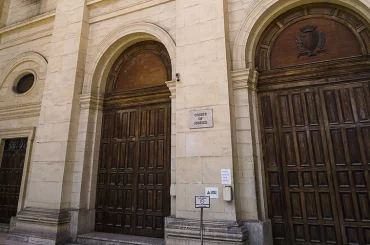Around nineteen officers have left the Financial Crime and Investigation Department (FCID) over a span of eleven months since the end of last summer, this website can reveal. Sources told this website that most if not all of those officers resigned before the end of their 25 years of service – upon 25 years of service, police officers are eligible for retirement pension.
The FCID has emerged as one of the largest and most prominent police department in the past few years. It is responsible for investigating and prosecuting financial crimes, including money laundering, terrorist financing, and corruption or bribery – and 2 years ago it moved into its dedicated premises in Santa Venera, a large building described or hyped as “state of the art”.
The exodus of officers – which averaged a resignation every 3 weeks – means the FCID has lost around fifth of its officers. It is understood that this has created disarray in some investigations, and left others languishing. It has also heaped additional pressure on remaining officers – the department has been struggling to cope with the workload for many months.
The FCID has been led by Deputy Commissioner Alexandra Mamo for the past two years. Mamo was an Assistant Commissioner when she was appointed chief of FCID in July of 2020. She was eventually promoted to Deputy Commissioner a year later.

A process is currently underway to appoint a new assistant commissioner who would become chief of the FCID. Frank Tabone, the superintendent who used to lead one of the two squads within the FCID – the Anti-Money Laundering and Terror Financing Squad – ranked first in a selection process. Yet Tabone has since gone on long-term unpaid leave, becoming the highest profile departee from the FCID.
Superintendent George Cremona ranked second in the selection process.
Both Tabone and Cremona have a reputation as good, sharp officers, but whoever takes over the helm of the FCID would face the pressing task of steadying the ship and stemming the losses.
Shortage of officers at all levels
Although it is understood that the shortage of investigators in the FCID has become particularly acute – all the more so given the department’s prominence – multiple unconnected sources within the police who spoke to this website described shortage of officers or investigators in most or all squads. This includes the Major Crimes Unit and the Drugs Squad.
The shortage also extends to the police districts. “Most people’s interaction with the police is when they go report something to their district police station,” one officer said. “But the investigating officers are burdened due to shortage of officers.”
One officer in one district said that the inspectors in the district have such a heavy workload that they have no time to do thorough or meticulous investigations.

Community policing exacerbates shortages
The losses of officers across the board due to resignations has been exacerbated by the reassignment of many officers into the community policing programme.
The community policing programme is a project of police commission Angelo Gafa. The idea is to increase the presence of police in communities and improve the relationship – and communication – between the police and communities, and in the process reduce crime.
“It’s a good strategy on paper,” one source told this website. “Politicians also love the visibility of police in the community. But the problem is that the manpower does not exist for the programme, so we have ended up with a situation in which there are not enough investigators.”

The reassignment of officers into community policing has also stripped down the complement of officers of the district police. To mention one example, the district of Gozo, a total of 12 officers – 2 sergeants and 10 constables – have been reassigned to community policing. Yet this has led, most acutely, to a shortage of sergeants to serve the district team: two sergeants have to be on duty round the clock, but now there is a cyclical shift in which only one sergeant would be on duty. This could hobble investigations and arrest operations within that shift.
And the situation could become more acute if a sergeant goes on sick. In that scenario, one of sergeants in Gozo who currently serve as ‘custody officers’ – these are supposed to ensure that the rights of arrestees are respected or fulfilled – would have to be assigned to district work, and if an arresting officer has to double as the custody officer, arrestees could use that perceived conflict of interest to challenge their arrest in court.
For these reasons – and the fact that officers within the community policing do not take down reports of crimes (victims would still have to go to the police station to file reports) – officers this website spoke to expressed resentment towards community policing programme.
And that appears to be one of the elements that has been feeding disillusionment – and sapping morale – within the police ranks. This appears to be one of factors leading to resignations.

A sense of crisis or stagnation has also become pervasive among investigators – the inspectors, the superintendents – particularly in the squads or departments, including the FCID.
“The commissioner promised to move mountains upon his appointment,” one officer told this website. “But we have hardly started digging.”
Sustain Analyses & Insight
Robustly researched, extensively investigated, and professionally delivered analyses and insight features on this website take much time, effort, and resources to produce. This website's donation setup itself is uniquely transparent: you see what you donate for and any donation is added to the total amount of donation on the page. Click on button below to see how it works and contribute as little as €5.





